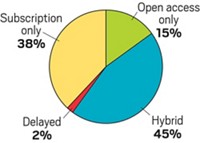Advertisement
Grab your lab coat. Let's get started
Welcome!
Welcome!
Create an account below to get 6 C&EN articles per month, receive newsletters and more - all free.
It seems this is your first time logging in online. Please enter the following information to continue.
As an ACS member you automatically get access to this site. All we need is few more details to create your reading experience.
Not you? Sign in with a different account.
Not you? Sign in with a different account.
ERROR 1
ERROR 1
ERROR 2
ERROR 2
ERROR 2
ERROR 2
ERROR 2
Password and Confirm password must match.
If you have an ACS member number, please enter it here so we can link this account to your membership. (optional)
ERROR 2
ACS values your privacy. By submitting your information, you are gaining access to C&EN and subscribing to our weekly newsletter. We use the information you provide to make your reading experience better, and we will never sell your data to third party members.
Policy
Accomplishing Lofty Goals
July 25, 2011
| A version of this story appeared in
Volume 89, Issue 30
In his 2011 State of the Union address, President Barack Obama conveyed that future situations are ours to win. The President stated: “We need to out-innovate, out-educate, and out-build the rest of the world.”
It is difficult to think about how we are going to accomplish these lofty goals when we are forced to limit our scientists’ access to the high-impact technical journals and books they have been trained to use during their graduate and postgraduate careers because of increasing subscription costs and changing copyright regulations. In the article “What Does Biotech Really Suffer From? Information Overload, or Underload?” (Xconomy blog, Jan. 18), Stewart Lyman, owner and manager of Lyman BioPharma in Seattle, laments that scientists are reading fewer journal articles because of lack of access to journals at small biotech companies. The author goes on to hypothesize that the decrease in scientific reading is in turn leading to a decrease in innovation in the pharmaceutical industry. This problem is not limited to small biotech companies; it is a problem across the pharmaceutical industry.
My corporate library has a focused collection of chemistry and biology journals and books when compared with the collection at an academic library. All of our journal holdings and books have been determined to be a necessity for us to competitively do our jobs. Over the past several years, owing to the rapid price increases and the attempted cost containment in paper journal production (page redesign and print size reduction), we migrated from a paper-based library model where we purchase the journals to an electronic “online” library model where we rent access to them.
Last fall, we saw moderate to large price increases on most of our journal subscriptions. Many publishers seem to be shifting their rate metrics from a flat (enterprise) electronic license fee to one based on “the number of articles opened online by our scientists.” This now changes the rented journal model to a “pay as you go” model.
The introduction of e-books is proving to be equally as problematic for libraries. My corporate library does not own any e-books but has had requests from our scientists for chapters from e-books. Licenses for e-books often prohibit libraries from lending copies to other libraries through interlibrary loan, limiting our scientists’ access to important literature. This e-book situation affects all libraries, including public libraries where some electronic titles can be checked out 25 times. Before the 26th patron can borrow the e-book, the license must be repurchased by the library, further driving up costs.
Unfortunately, to control costs, we were forced to winnow our collection. Our scientists are now forced to think carefully about the articles they open and read. They are also facing the possibility of not being able to gain access to chapters of important reference books. Gone are the days of browsing the journals and books for ideas, or pleasure; going further back in time, gone are the days of reading the back cover of the Journal of Organic Chemistry for the latest Aldrich Chemical advertisement.
In this, the International Year of Chemistry, scientists must be provided with affordable journals and books to stimulate innovation in our universities, research labs, and industry. It is difficult to think about how we are going to push the frontiers of science when it has become too costly and limited for scientists to read new and innovative high-impact peer-reviewed articles and books in their fields of study.
By Wendy Quinn
Associate librarian
AMRI
Albany




Join the conversation
Contact the reporter
Submit a Letter to the Editor for publication
Engage with us on Twitter